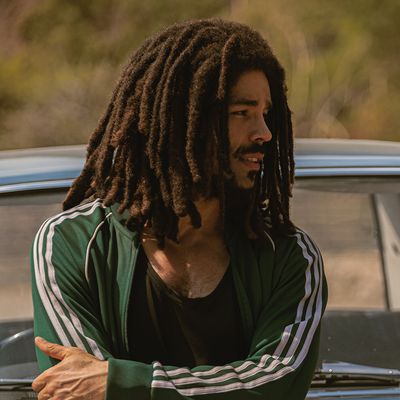
A word salad of expository title cards describing Bob Marley’s youth and the origins of political violence in Jamaica opens Bob Marley: One Love, offering a clue to the quandary in which the film finds itself. The picture gives us a small but pivotal slice of Marley’s career from the attempt on his life in 1976 to the period he spent abroad in its wake, recording Exodus in London and the subsequent world tour that saw reggae music become a major international phenomenon. But the filmmakers can’t commit to their own conceit. They keep trying to contextualize, to present little glimpses of the past, and are instead left with a hollow biopic.
The film’s most evocative image comes relatively early, after Bob (Kingsley Ben-Adir) survives a brutal assassination attempt and heads to the mountains outside of Kingston to reconsider whether he’ll be playing his much-publicized “Smile Jamaica” concert, due to be held right before the country’s elections. Bob, called “the skipper” by his Wailers bandmates, stands on the edge of a precipice at night, looking at the city below and the ghostly light emanating from the stadium where he’s set to perform. It’s a real moment taken from Marley’s life — similar archival footage can be seen in documentaries — and it possesses the kind of throwaway poetry the movie could use a lot more of. The filmmakers (director Reinaldo Marcus Green and his co-writers, Terence Winter, Frank E. Flowers, and Zach Baylin) have clearly done the work of sifting through Marley’s life and finding choice nuggets to put onscreen. But they haven’t managed the artistry or effectively dramatized any of the material other than in the most simplistic ways imaginable. The result is a shallow picture book populated with cutouts where people should be.
As Bob and the Wailers leave Jamaica for London to do some soul-searching and record their next album, the film flashes back to glimpses of his youth. We see a young Bob running from a burning field, pursued by a shadowy man on a horse who may or may not be the white father he never really knew. We see his embrace of the Rastafari faith and the way it gave him a sense of belonging. At every step, we want to know more — not because what the film presents is tantalizing but because it’s so vague. A couple of early Wailers performances make us curious about the band’s formative years: Seeing young Bob as a supremely talented but unsure teenager, we wonder how he became the skipper. The film doesn’t really have any answers for us.
One Love seems almost afraid to spend too much time with its characters lest we learn potentially unsavory or complicated things about them. During the assassination attempt, Marley’s wife, Rita (played by the great Lashana Lynch, getting screen time but little else), is shot in the head and then promptly returns a couple of days later to be at his “Smile Jamaica” concert, which the real Rita did in fact do, quite spectacularly. But we sense very little tenderness in their exchange right beforehand. Is this a subtle suggestion of the transactional nature of their relationship, or is it just the filmmakers not quite knowing how to depict a complex marriage? Late in the movie, we get an obligatory outburst from Rita about the fact that she has been raising all of Bob’s kids, including ones he had with other women. But it’s just lip service, narrative beat delivery instead of anything that provides any insight into the life of this remarkable woman. Nobody has done the actual work of trying to imagine any of these people in all their full-blooded complexity. They’re shown as gods with occasional flaws, the standard approach of hagiography.
Maybe the production tried at some point. In London, we catch extremely brief background glimpses of Cindy Breakspeare (Umi Myers), the Jamaican beauty queen with whom Bob had a lengthy love affair. She gets no real dialogue, however, and maybe one quick close-up, almost as if the character were cut from the finished movie. This basically reduces her to groupie and hanger-on status — quite shocking, frankly, for a woman who was ever-present in Bob’s life during this time and with whom he had a child. While it would be easy to assume the Marley family’s involvement in the production mandated short shrift being given to this and other relationships, that’s probably inaccurate; other documentaries about Marley produced in partnership with his family have not avoided these subjects. (This includes Kevin Macdonald’s excellent and expansive 2012 documentary, Marley, which you may want to watch instead.) No, this seems more like the filmmakers shying away from portraying Bob and Rita Marley and the people around them as actual human beings with actual lives who existed in the real world.
At least the songs are good, and there are, thankfully, a lot of them. One Love comes alive in its musical sequences, and Ben-Adir comes close to capturing the energy of Marley’s joyfully shamanistic, transported whirling and hopping. Watching him perform and seeing the fluidity with which the band plays both in the studio and onstage, we may find ourselves wishing the film had stuck entirely to re-creating Marley’s Smile Jamaica concert, the Exodus sessions, or even the 1978 One Love Peace Concert. Marley told his life story through his music; his lyrics are raw, confessional, and surprisingly specific. That his work found purchase all over the world seems paradoxical, but it really isn’t — that’s the whole point of great art. Listening to Marley’s songs, we understand something essential about him. Walking away from One Love, however, we somehow know less about him than we did going in.


